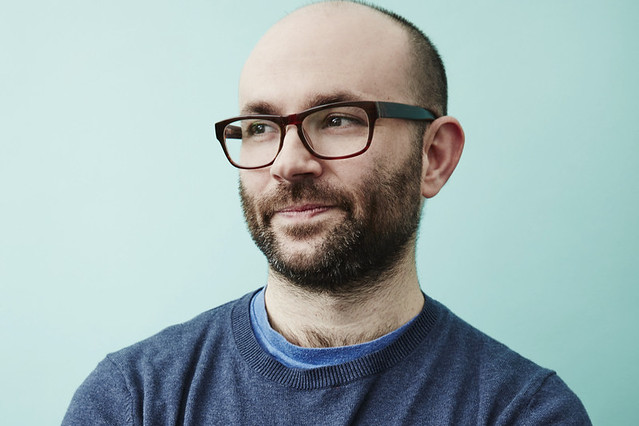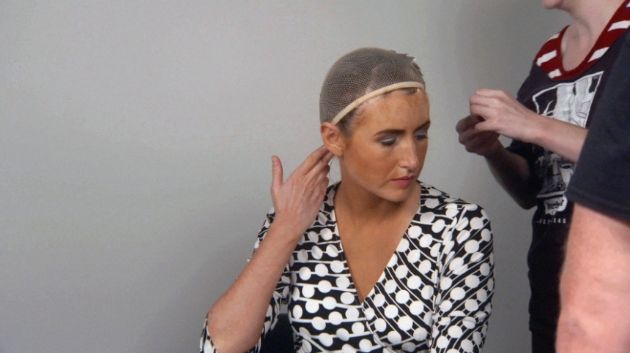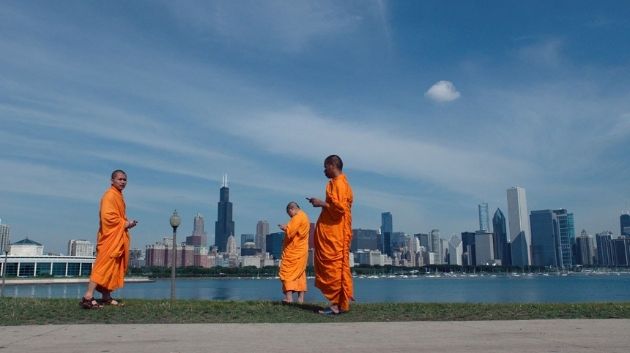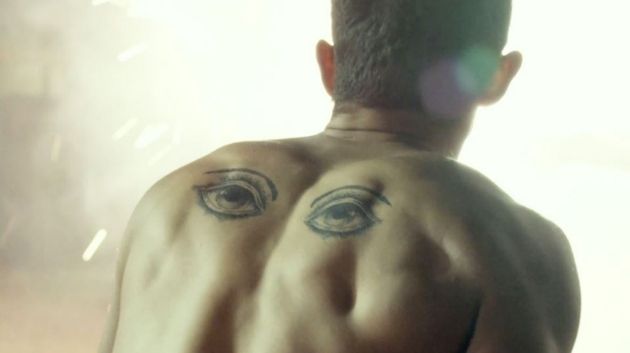
I first encountered Robert Greene's inventive and daring filmmaking at the Art of the Real film series in 2013.
Actress, his film starring Brandy Burre playing herself in a documentary-style portrayal of an aging actress in upstate New York, was decidedly refreshing in a documentary world inundated with straight up character studies that are as predictable and boring as reading someone's short bios on wiki. With his new film Kate Plays Christine coming out in theaters, Greene's adventure into meta filmmaking continues, digging deeper into the very nature of performance and also of the filmmaking process. It is a densely layered, thought provoking, endlessly fascinating piece of work that is very rare in the American Indie cinema landscape.
I got a chance to talk with Greene on the phone recently. Fiercely intelligent and always searching, Green talked at length about his approach in his unique filmmaking process.
So you are in Missouri now?
I am in Missouri, yeah. I’ve been living here, going on two years now.
Do you teach at the University of Missouri?
I do. The university got a big grant from Jon Murray, the guy who started The Real World and is a graduate of the the journalism school here, and we started the Documentary Journalism program. They hired me as a Filmmaker in Chief, so I get to do my own classes and they encourage me to make films. It’s not like I have to do my films on the side. It’s part of my job, so it’s great.
How’s it been going for you there?
I like it. I like teaching. I like being here and having a family. We are happy being in this small town and my wife was ready to get the hell out of New York. So we were happy to go. And I quite like teaching, actually.
The first time I saw ACTRESS was at the Art of the Real Film Series here in New York. I thought it was really interesting that you were one of the few American filmmakers presenting in the series. I really got a lot out of that film series. By far the best film series even in New York standards. It just blew me away.
Yeah, it’s a cool series.
I was wondering how you ended up choosing the Christine Chubbuck’s story after doing ACTRESS?
I had heard of her story about 10-12 years ago for the first time. This was before I made my first feature, even. At the time, I was probably in the mindset of listening and looking for possible stories. But the immediate feeling I had was that ‘this is not a story that I can tell’ because of what happened and details around that story bring a lot of questions about representation and about depression and why we try to tell stories about people who did things like what she did. I guess the feeling that I had for the last 10 years or so was that I shouldn’t do that film -- which is a weird feeling to hold on to.
But after Actress, I saw the possibilities in filming a documentary about an actor. With that I saw an opening to not only investigating THE Christine Chubbuck story but also expressing that feeling of anxiety about telling the story. So it opened up a pathway for me to see how I’d do it.
I thought the way you went about the film was really interesting. You are working closely with another actress here again. This time, it’s Kate Lyn Sheil. How was the collaboration? I am curious about your method in working closely with actresses.
Well, we are old friends. We needed to all be friends -- me, Kate, our cinematographer Sean Price Williams, our producers. We are all an extended family in a way. It’s kind of the only way we could make this movie, with a deep sense of trust, because, you know, when I went to Kate and said, 'OK I have this concept: I’m gonna document you while you are trying to make a film that shouldn’t be made.' In doing so, we know it’s going to fail on purpose. And it’s gonna be bad on purpose.
That’s something you can easily say, “oh, that sounds interesting” and yes to. But in practice, it’s quite exhausting for Kate to go through that. It’s very difficult for an actor to act badly. It just goes against all your instincts. So that whole thing, ended up very difficult to navigate. Kate was becoming so attached and so connected to Christine’s story and just the feeling of responsibility to portray Christine was overwhelming for her.
Ultimately she trusted me and I trusted her. But the contention really was, we would roll these reenactments and she’d say, “ That was terrible,” and I’d say, “That was great.” (Laughs.)
That's a weird place to be. Beyond that, Kate isn’t exactly comfortable with being documented in general. And it's a part of the reason why we did it. The original idea was for Actress was it was going to be a triptych with Kate, Brandy and an older actor but Brandy’s story just took over as it should.
Oh, I see.
I thought I was breaking Kate’s heart by saying we aren’t making a documentary about her but she said thank god.
I knew that there would be some tension on the screen just with filming her. And also, going in purposefully inadequate reenactments and then also even with the documentary process I knew that she would eventually turn on me, you know. For me that was part of it.
But a lot of times I had so much trust in her. By virtue that she knew where the film needed to go, which even created sort of an extra layer to her performance. She was basically playing up emotions she already had, all of which is in the film.
You are meant to be questioning all these things as you are watching and hopefully put your mind together to read her motivations, the way we tried to read Christine’s motivations. It’s all meant to put you in a psychological space of trying to read through what you are watching.
There certainly are a lot going on in the film. Going back to your creative process, how much of it was scripted and how much was improvised?
The feeling that I wanted, I wanted to make a movie within movie scenes to feel like they are a documentary of a fake movie and I wanted the documentary scenes to feel fictional. We shot them to feel that way.
The way I like to look at it is that I built sort of a conceptual box and within that conceptual box, we filmed a documentary. So that means, we were there for three weeks; we came in with certain things I wanted to get. I wanted her to be writing down the differences between her and Christine and reading them out loud. I wanted her to potentially tackle things like running into the water.
These things are what I wanted to happen. So these things are ones that could be scripted. But I would say they are not any more scripted than, you know, a standard documentary that does things like, hey we are gonna go here now and film this kind of thing.
Right.
So I would set it up and we watch what happens. So I was basically instigating situations and observing what was happening. There's also a level of performance that Kate brings to the table naturally when there is a camera on her, just like when there is a camera on anybody -- she's going to be performing. The difference is that she’s an actor so she is aware of that performance on a higher level. So even when we were filming her walking down the strip mall, going to a store, or when we were filming her interacting with a real person, there is an element of acting.
For me, the question of what’s real and what's non-fiction is only interesting as a starting point, It’s only interesting when we present that as a central question of the movie. Rather than revealing that at some point as 'oh it’s this or that', or 'we were tricking you', it’s really trying to drive you into the narrative, sort of the psychology of not only Kate but in some ways Christine, because when you’re looking at it going I don’t know what’s real and what’s being motivated and don’t know why — if it works properly, it could work as a psychological thriller and drives you into the story. You are left with trying to figure out what you are watching.
That also has a metaphorical parallel with Christine’s life and the sort of performances she was giving and there is this relationship between the performance and depression that she was constantly trying to balance, I think. Hopefully, the form that we created -- sort of questioning fiction or non-fiction things -- drives you deeper into something real.
I guess Werner Herzog put it as the Ecstatic Truth, or something like that in documentary.
Yeah, I just come at it from the angle of… that the documentaries are a staging ground. The myth of the documentary, whenever you say documentaries aren’t reality or documentaries aren’t objective, everyone says 'of course, of course' but when they start watching, they set it to be that way.
And I prefer to think of it as sort of a launching pad for something else. What that means is that you are dealing with the real thing -- you are dealing with things you can’t predict. We went into the process with something that we wanted but almost everything you see was totally unpredictable and risky to even try and capture it.
To me what makes a documentary is that everything was discovered, found with a great deal of uncertainty. You need to have pillars of stories that you can grab onto, but the driving energy of the film is in its deep sense of uncertainty.
The performance aspect of your filmmaking, from FAKE IT SO HARD to ACTRESS to now KATE PLAYS CHRISTINE, is that everything you see in your films is about performance somehow that is imbued in real life. Is that a fair assessment?
Yeah. I very much believe that the cliché or the maxim, however you want to call it, that the world is a stage. I am very interested in social performances as a social phenomenon, as things that define our daily interaction that we are performing roles -- we dress a certain way, we talk a certain way that we are performing our identities every day and we know that right?
But when you put a camera in there, we can intercept that performance and it becomes something else. When you can kind of make it so viewers can sense it and can see it then you start to read into things in a way that is productive and layered. Then you have a capacity of creating on-screen tension and real revelations about human behavior by capturing these performances and presenting them in a certain way.
That's what I love about Frederick Wiseman. Wiseman would not say he was getting performances but when you watch his movies you know they are carefully crafted. They are depictions of real life people, usually at their work. With a movie like Welfare, you have to perform the duty of an welfare officer but you have to perform the duty of someone receiving the welfare and you see the battle of these performances.
If we detect them as performances, we can do a better job of understanding what they mean in the bigger context of society and how to make the world work better, you know. You have to act a certain way or behave a certain way to get things done. Acting and behaving are really linked and I think it’s very interesting to put them in the movie, at least as a springboard for other questions.
Fake it so Real was about switching up the idea of what you thought of as a documentary performance and Actress was really about the role that we get trapped in. In Kate, performance is a springboard for a deeper investigation in some ways.
Do you think you and Kate are in any way close to finding out who Christine was after this experience?
I don’t know. So much of the process was just bewildering, which I think you see in the film. All I can say comfortably is that she was an incredibly complex person. Some people saw her as hard and distant, some thought she was funny and graceful, some thought she was deeply empathetic and a good friend and some thought she was very weird and off-putting. That’s honestly what we all are being described as.
Right.
If we take three or four facts of her life that made her commit suicide the way she did, I think it would be an inadequate portrait of who she was. So I feel very very comfortable saying that I don't know who she was. I feel touched by her story because I spent a long time thinking about it but that’s got nothing to do with her. It would be irresponsible for me to say I know her better now.
As you know there is another film, a fictional account of Chubbuck called CHRISTINE by Antonio Campos coming out. Not that I am dismissing his film but you think there is any way to portray a human being as complex as she was in a narrative format or is it that you are just going from a different angle?
It’s just gotta be a different angle. First of all, these sort of critiques of the movies they are presenting, they are all pointed inwards. They are all pointed to me and Sean and Kate and our producers. We are wrestling with ourselves. Me, I am much more in dialog with the documentary world as anything.
But they are not meant to be critiques of someone else’s vision at all. Having said that, the only way to make a fictional narrative is to conflate things to an extent you as an artist are comfortable doing. I don’t know if I am comfortable doing those things.
But I’ve seen the film and Rebecca Hall’s performance is incredible. I think what she did was, she created a new character out of the very limited information she got. And that new character is what Rebecca Hall and Tony Campos and their team created -- what they think is Christine Chubbuck. I think that’s just limited as anything but that doesn’t mean there is no value in it.
So you are OK with their representation of who she was.
I think there should be a long discussion to be had about anyone’s representation of the story. What I like about the fact that there’s two movies coming out about Chubbuck, people will have that discussion. I think the nature of our film and the nature of their film is going to create the conversations about representing the story in a way that I think will be very interesting.
Has Campos seen your film?
Yeah. I think we both feel the same way which is, 'not how I’d do it but more power to you' kind of way. It’s so personal for both teams, so it’s hard not to see it that way but I’m all for the conversation that it's going to create.
So what’s next for you?
I have this film I want to make about this event of a labor history that happened a hundred years ago. I want to sort of reenact it. It will be a reenacted ghost story that takes place in the present in a documentary setting. Kind of staging a performance in a real space in the southwest. So we are going to be making sort of gonzo, Western, documentary ghost story.
It was called the Bisbee Deportation where twelve hundred striking miners were forcibly removed from their homes and beaten and shipped to the New Mexico desert to die, pretty much.
That's great. I am pretty familiar with the labor history of the United States around that period. I can't wait to see that!
We have to raise the money, but hopefully we will get to reenact that in the centennial year of 2017.
Kate Plays Christine opens at the IFC Center in New York on Wednesday, August 24. A special preview screening will be held tonight (Tuesday, August 23) at 7:30pm at IFC Center followed by a discussion with the filmmaker.



